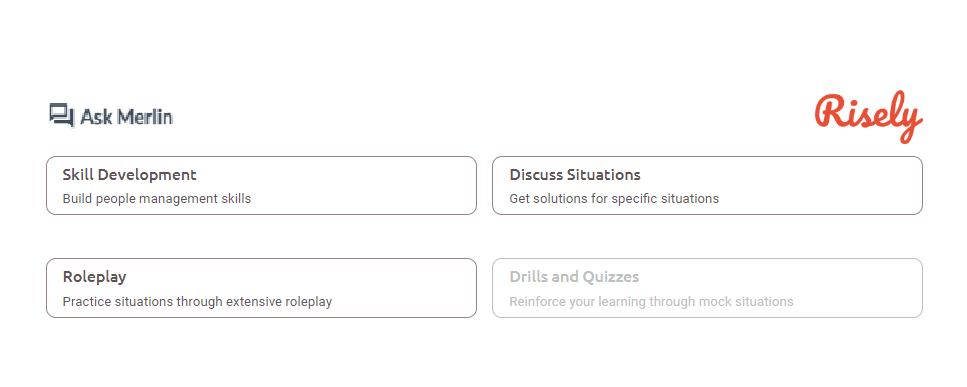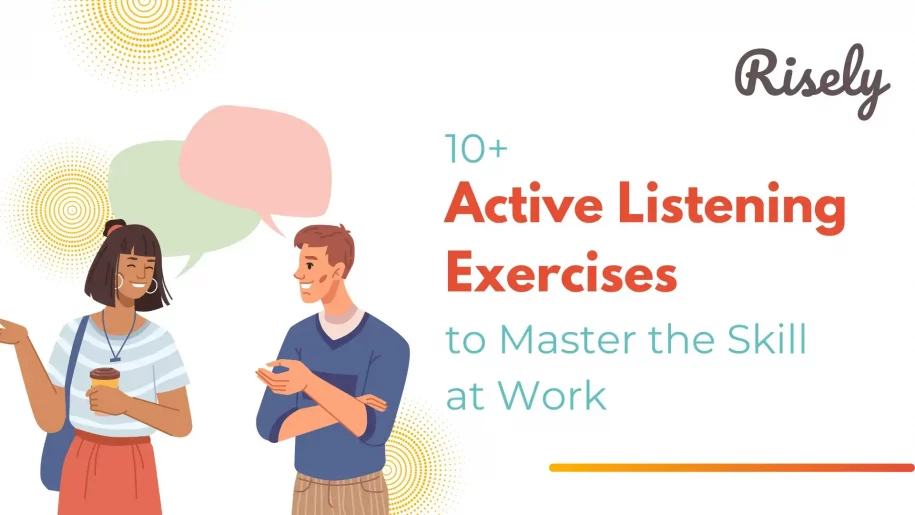10+ Active Listening Exercises to Master the Skill at Work
“Communication” is a big word, and for a good reason. It encompasses every aspect of our lives – from listening to understanding and everything in between. Communication is all about listening to what people say and reflecting on it to them in a way that facilitates learning and connection. Listening well supports communication, which we do when seeking mutual understanding with another person – whether it’s listening to their words and reflecting them to them or listening to their body language and cues and responding accordingly. It’s a skill that spans communication on an interpersonal level up to international diplomacy. In this blog, we will discuss active listening exercises that can help you improve your listening skills at work.What Is Active Listening?
Active listening is a soft skill that involves paying attention and understanding what someone is saying without passing judgment. In workplaces, active listening skills are essential for building good relationships between colleagues and creating effective teamwork. In addition, it helps build trust between people and improves communication, benefiting everyone involved.- Paying Attention: This means giving the speaker total mental and physical attention. It involves actively listening to the speaker’s words, observing their body language, and minimizing distractions.
- Showing Understanding: This means demonstrating that you understand the speaker’s perspective by reflecting on what they are saying, asking clarifying questions, and acknowledging their feelings.
- Providing Feedback: This means responding to the speaker’s message with accurate and constructive feedback. It involves summarizing what the speaker said, expressing empathy for their feelings, and providing respectful and constructive feedback.
- Improved Communication: Active listening helps create a more open and honest dialogue. It allows both parties to feel heard and understood, leading to better communication and fewer misunderstandings.
- Strengthened Relationships: Active listening helps to build stronger relationships by fostering mutual trust, respect, and understanding.
- Increased Productivity: Active listening can lead to greater efficiency and productivity by reducing the need for clarification, repetition, and follow-up communication.
- Conflict Resolution: Active listening is an effective tool for resolving conflicts because it helps to identify and address underlying issues, reducing the potential for misunderstandings and miscommunications.
- Personal Growth: Active listening has been proven to be an effective catalyst for personal development. It promotes personal growth and self-awareness by encouraging individuals to reflect on their communication styles and biases.
Active listening in the Workplace
For working professionals, their work becomes their second home. A place where they spend most of their time of day. This also requires individuals to develop several skills to handle everyday interactions and challenges smoothly. One such skill is that of actively listening. As we all know, communication plays a vital role in all spheres of our lives. And active listening is quite an integral part of communicating effectively. As discussed above, there are several benefits that one can enjoy if one practices active listening. It becomes essential for managers as it helps improve workplace relationships and reduce stress. A study has found that teaching managers active listening skills improved their ability to support employees with mental health problems. Also, managers who train their employees using active listening exercises become better at actively listening to themselves. Check out Breaking Down the Walls: Understanding 6 Active Listening Barriers.Other Interesting Reads
10+ Active Listening Exercises for Workplaces
Active listening is a vital skill for managers to develop, enabling them to understand their team better, increase productivity, and foster positive relationships. Here are some fun active listening activities managers can use to develop their skills:The Picture Prompt Exercise
This is a type of active listening exercise where the manager should choose an image or picture and describe it to their team. Based on the manager’s description, the team must then draw or visualize the picture. This exercise helps managers improve their listening skills as they learn to be more descriptive and clear in their communication. In contrast, the team knows to listen more carefully and pay attention to detail.The Memory Game Exercise
In this active listening exercise for work, the manager should create a list of items and read them aloud to their team. The team must then try to remember the items in the correct order. This exercise helps managers improve their listening skills by practicing their ability to communicate information clearly and concisely. In contrast, the team improves their ability to listen carefully and remember information accurately.The Role-Playing Exercise
In this exercise, the manager and team members switch roles and act out different scenarios. This exercise helps managers develop their listening skills as they learn to pay attention to the other person’s point of view and perspective while the team learns to communicate more effectively and become better listeners. Risely, the AI coach for leadership development can help you in this exercise as well! With the support of AI bot Merlin, your buddy for growth, you can easily practice scenarios through role-plays, discuss specific situations, and focus on developing particular skills. Just define the position you want to discuss, the moods and tones of the people involved, and get started. Catch a snippet below and sign up for free today to start exploring.
The Active Listening Feedback Exercise
In this active listening exercise, the manager provides feedback on the team member’s active listening skills. The manager should give positive feedback when team members demonstrate good listening skills and constructive feedback when they could improve. This exercise helps managers develop their listening skills by teaching them to identify good listening behaviors while the team members learn to listen more effectively. Check out 10+ Positive Feedback Examples You Need For Your Next Review.Simon Says
This is one of the classic active listening exercises that involves listening and following instructions. The manager can lead the game by giving commands starting with “Simon Says…” or without it. They’re out if a team member performs an action without the “Simon Says” prompt. This game can be modified to include work-related tasks or challenges, making it fun to practice active listening skills in a work setting.Two Truths and a Lie
This active listening game for workplace involves listening carefully and identifying the lie. Each team member shares three statements about themselves, and the other team members must determine which statement is false. This game is an excellent way for managers to develop active listening skills by paying attention to details and making connections between the statements.The Mindfulness Exercise
This is one of the active listening exercises where the manager leads a short mindfulness meditation session in this exercise. The team members should focus on breathing and quieting their minds. This exercise helps managers improve their listening skills by learning to be more present and attentive while the team members learn how to focus their attention and become better listeners. Check out “Why active listening training is crucial for effective leadership?”Storytelling Circle
This is one of those active listening exercises where the manager starts telling a story and passes it on to the next team member to continue. The story continues until it comes back to the manager, who concludes it. This game helps managers develop their active listening skills by paying attention to details and making connections between the different parts of the story.Guess Who
This game involves listening carefully and identifying a person based on their description. The manager describes a person, and the team members must guess who the person is. This game is a fun way for managers to develop their active listening skills by paying attention to details and making connections between the different pieces of information.Telephone Game
This is one of the active listening exercises that involves listening carefully and passing on information. The manager can start by whispering a sentence to the first team member, who then whispers it to the next team member, and so on. The last team member says the sentence out loud, and the group compares it to the original sentence. This game is an excellent way for managers to develop their active listening skills by paying attention to the original message’s details and passing them on accurately. Check out “Let’s reflect on reflective listening to become a better listener with 8 tips.”Listening Journal
Encourage team members to maintain a listening journal for a week. They can write about their experiences in various meetings, conversations, and interactions, highlighting their challenges and any improvements they observed in their listening skills.Active Listening Walk
Take the team outside for a walk or find a quiet space indoors. Instruct team members to listen attentively to the sounds around them and note as many different sounds as they can identify during a set period (e.g., 5 minutes). Reconvene and share their experiences, discussing the importance of mindful listening in understanding the environment and colleagues’ perspectives.Resource Buckets for you!
- 5 Easy & Fun Icebreaker Office Games For Teams
- 5 Fun and Effective Expectation Setting Activity For All Managers
- 5 Best Problem-Solving Activities To Build A Successful Team
- 10 impactful constructive feedback exercises for managers
Conclusion
This blog gave you several fun, interactive active listening exercises that would directly assist you and your team members in improving your active listening skills. These active listening exercises can be applied to whichever field you are in and make you a master in listening actively and, subsequently, a master in communicating. As you have read, active listening exercises are not difficult to do or something that would require many resources. You just need your team with you and some dedicated time to try to listen more actively. Not only would these activities help in improving listening skills, but they also become a great way of team bonding. You’ll be amazed how these simple exercises will make you much better at listening once you put them into practice, and the more you practice, the better you become.Grab free expert-curated resources to master active listening
Download the free active listening toolkit to know the ins-and-outs of active listening.
FAQs
Why is active listening important in the workplace?
Active listening is a crucial skill in the workplace that enables managers and team members to understand each other’s perspectives and needs. It promotes a positive work environment, fosters better communication, and increases productivity and effective conflict resolution. Additionally, it enhances leadership skills by building stronger relationships and motivating teams to achieve organizational goals.
How can I test my active listening skills?
Testing your active listening skills involves reflection, paraphrasing, asking questions, seeking feedback, and summarizing key points. Regularly practicing these skills can improve your ability to listen a0ctively and communicate effectively. Another quick and efficient way to check active listening skills would be using Risely’s free self-assessments. Try our active listening self-assessment to understand how good you are at being an active listener.
Other Related Blogs
10 Types of Interviews Every Hiring Manager Should Know
10 Types of Interviews Every Hiring Manager Should Know Interviews are a crucial part of the job search process, as they provide an opportunity for hiring managers to assess potential…
Performance Management Training: Empowering Managers To Manage Better
Performance Management Training: Empowering Managers To Manage Better Remember that feeling of dread when you knew performance review season was rolling around? Yeah, us, too. For many employees, performance reviews…
Leaders Who Don’t Listen Often Fail. Here’s 5 Reasons Why
Leaders Who Don’t Listen Often Fail. Here’s 5 Reasons Why Leadership is a complex and dynamic role that requires a diverse set of skills and qualities. While many attributes contribute…
Grooming for Management: The Key to Building a Sustainable Leadership Pipeline
Grooming for Management: The Key to Building a Sustainable Leadership Pipeline Imagine a crucial leadership position opening up in your organization. You scramble to fill the role, internally and externally,…


